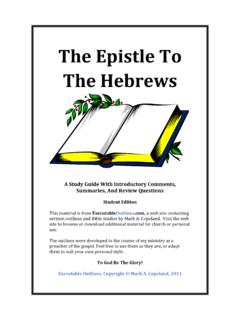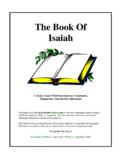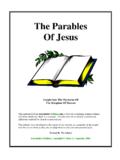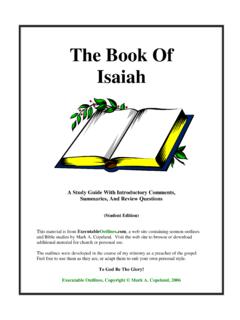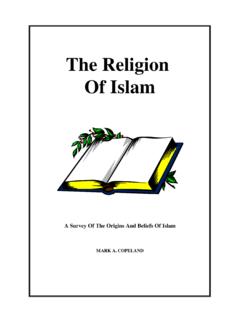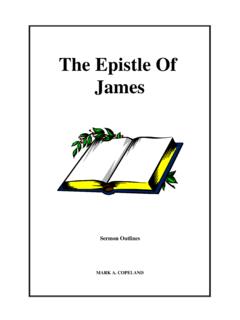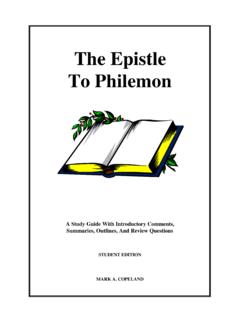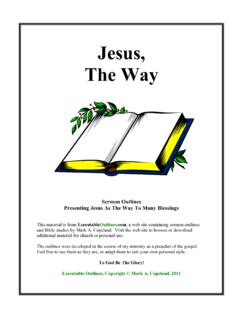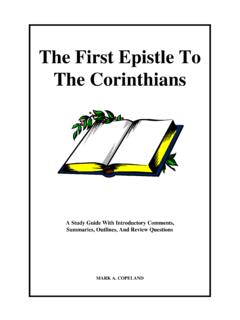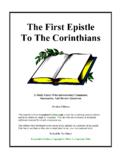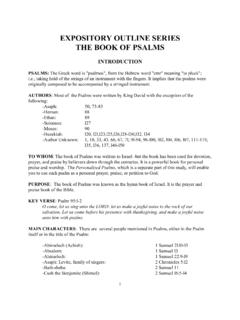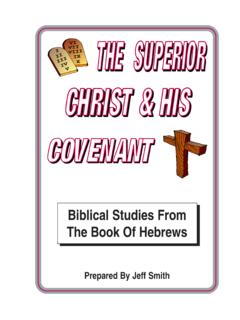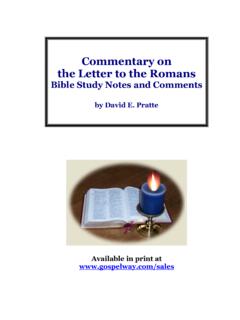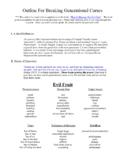Transcription of The Gospel Of Matthew - Executable Outlines
1 The Gospel Of Matthew A Study Guide With Introductory Comments, Summaries, And Review Questions This material is from , a web site containing sermon Outlines and Bible studies by Mark A. Copeland. Visit the web site to browse or download additional material for church or personal use. The Outlines were developed in the course of my ministry as a preacher of the Gospel . Feel free to use them as they are, or adapt them to suit your own personal style. To God Be The Glory! Executable Outlines , Copyright Mark A. Copeland, 2011 2 The Gospel Of Matthew Table Of Contents Introduction 3 Chapter Fifteen 21 Chapter One 7 Chapter Sixteen 22 Chapter Two 8 Chapter Seventeen 23 Chapter Three 9 Chapter Eighteen 24 Chapter Four 10 Chapter Nineteen 25 Chapter Five 11 Chapter Twenty 26 Chapter Six 12 Chapter Twenty-One 27 Chapter Seven 13 Chapter Twenty-Two 28 Chapter Eight 14 Chapter Twenty-Three 29 Chapter Nine 15 Chapter Twenty-Four 30 Chapter Ten 16 Chapter Twenty-Five 31 Chapter Eleven 17 Chapter Twenty-Six 32 Chapter Twelve 18 Chapter Twenty-Seven 33 Chapter Thirteen 19 Chapter Twenty-Eight 34 Chapter Fourteen 20 This study guide was designed
2 For adult Bible classes, though it might be suitable for junior and senior high classes as well. Some have used it for personal devotions, and others in small study groups. Points to ponder for each chapter are things I emphasize during the class. Review questions are intended to reinforce key thoughts in each chapter. That you might know what answers were intended by the questions, I have included them in this guide. There is a student edition available with answers deleted. 3 The Gospel Of Matthew Introduction The book of Matthew has always occupied a position of high esteem in the faith and life of the church: When we turn to Matthew , we turn to the book which may well be called the most important single document of the Christian faith, for in it we have the fullest and the most systematic account of the life and the teachings of Jesus.
3 " (William Barclay) The writings of the early church fathers reveal that it was the most frequently quoted and perhaps the most widely read Gospel during the first two centuries of the church's history. Author The apostolic origin and canonical rank of the Gospel of Matthew were accepted without a doubt by the early church (ISBE). Matthew , surnamed Levi, had been a tax-collector, one of Jesus' earliest disciples (Mt 9:9; Mk 2:14). He was chosen to be one of the twelve apostles (Mt 10:2-3). A close associate of Jesus during His ministry, Matthew 's Gospel is a first hand account, unlike Luke who depended upon other eyewitnesses (Lk 1:1-4). Date Irenaeus says it was written when Peter and Paul were preaching in Rome (Against Heresies ).
4 Eusebius states that this was done when Matthew left Palestine and went to preach to others (Historia Ecclesiastica, III, 24). Clement of Alexandria said that the presbyters who succeeded each other from the beginning declared that "the gospels containing the genealogies ( Matthew and Luke) were written first" (Eusebius, Historia Ecclesiastica, VI, 14). It is traditionally dated in the late 50s or early 60s Theme The Gospel appears written to Jews, designed to prove that Jesus is the Messianic king of old testament (OT) prophecy. This is evidenced by Matthew s frequent appeal to OT Messianic prophecies. He quotes from almost every book in the OT, and twelve times he identifies OT prophecies as fulfilled in the life of Jesus (Mt 1:22; 2:15,23; 4:14; 5:17; 8:17; 12:17; 13:14,35; 21:4; 27:9).
5 One could therefore say that the theme is: Jesus, the King of the Jews Special Characteristics It is a Jewish Gospel . We've noted its frequent appeal to OT prophecies. It's organization is mostly topical, as opposed to strictly chronological (a common style in Jewish literature). Thus it appears to have been written with a Jewish audience in mind. It is an ecclesiastical Gospel . It is the only Gospel which mentions the word "church". It foretells its beginning (Mt 16:18), and describes some of the life in the church (Mt 18:15-17). It contains lengthy discourses especially beneficial to those in the church, such as the sermon on the mount (Mt 5-7), the many parables (Mt 13), and the Olivet discourse (Mt 4 24-25).
6 It contains admonitions important to disciples of Christ, such as the importance of doing the Father's will (Mt 7:21-23) and observing all that Jesus commanded (Mt 28:20). In other words, this was a Gospel designed for use by those in the early church. It is an evangelistic Gospel . It is a preaching Gospel , especially when compared with the apostles' preaching found in Acts. It expands upon the basic elements and points made in their sermons. Consider these themes in apostolic preaching: God's promises in the OT have been fulfilled - Ac 3:18,24 The long-awaited Messiah, born of David's line, has come - Ac 13:23 He is Jesus of Nazareth - Ac 13:23 He went about preaching and doing good through mighty works - Ac 10:38 He was crucified according to the promise and will of God - Ac 2:22,23 He was raised from the dead, and exalted at God's right hand - Ac 2:24,32-33 He will come again in glory to judge the living and the dead - Ac 3:20-21; 17:30-31 Therefore, all should heed His message, repent, and be baptized - Ac 2:36-38 All of these points are expanded upon in the Gospel of Matthew .
7 Outline (adapted from The Wycliffe Bible Commentary) 1. The birth and childhood of Jesus - Mt 1:1-2:23 a. Genealogy of Christ - Mt 1:1-17 b. Birth of Christ - Mt 1:18-25 c. Visit of the Magi - Mt 2:1-12 d. Flight into Egypt and massacre of the infants - Mt 2:13-18 e. Residence at Nazareth - Mt 2:19-23 2. The preparation for the ministry of Jesus - Mt 3:1-4:11 a. The forerunner of Christ - Mt 3:1-12 b. Baptism of Christ - Mt 3:13-17 c. Temptation of Christ - Mt 4:1-11 3. The ministry of Jesus in Galilee - Mt 4:12-18:35 a. Residence at Capernaum - Mt 4:12-17 b. Call of four disciples - Mt 4:18-22 c. General survey of the Galilean ministry - Mt 4:23-25 d. Sermon on the mount - Mt 5:1-7:29 e.
8 Ten miracles and related events - Mt 8:1-9:38 f. Mission of the twelve - Mt 10:1-42 g. Christ's answer to John, and related discourse - Mt 11:1-30 h. Opposition from the Pharisees - Mt 12:1-50 i. A series of parables on the kingdom - Mt 13:1-58 j. Withdrawal of Jesus following John's beheading - Mt 14:1-36 k. Conflict with the Pharisees over tradition - Mt 15:1-20 l. Withdrawal to Phoenecia and healing of a Canaanitish woman's daughter - Mt 15:21-28 m. Return to the Sea of Galilee and performing of miracles - Mt 15:29-38 n. Renewed conflict with the Pharisees and Sadducees - Mt 15:39-16:4 o. Withdrawal to the region of Caesarea Philippi - Mt 16:5-17:23 5 p. Instruction of the twelve at Capernaum - Mt 17:24-18:35 4.
9 The ministry of Jesus in Perea - Mt 19:1-20:16 a. Teaching on divorce - Mt 19:1-12 b. Blessing of the children - Mt 19:13-15 c. Interview with the rich young man - Mt 19:16-30 d. Parable of the laborers in the vineyard - Mt 20:1-16 5. The ministry of Jesus in Judea - Mt 20:17-34 a. Another prediction of Christ's death and resurrection - Mt 20:17-19 b. Ambitious request of Zebedee's sons - Mt 20:20-28 c. Healing of two blind men - Mt 20:29-34 6. The ministry of Jesus in Jerusalem - Mt 21:1-25:46 a. Triumphal entry - Mt 21:1-11 b. Cleansing the Temple - Mt 21:12-17 c. Cursing of the barren fig tree - Mt 21:18-22 d. Questioning of Jesus' authority and his parabolic answer - Mt 21:23-22:14 e.
10 Questioning of Jesus by various groups - Mt 22:15-46 f. Jesus' public denunciation of the Pharisees - Mt 23:1-39 g. Olivet Discourse - Mt 24:1-25:46 7. The suffering of Jesus - Mt 26:1-27:66 a. Plot against Jesus - Mt 26:1-16 b. The final meal - Mt 26:17-30 c. Prediction of Peter's denial - Mt 26:31-35 d. Events in Gethsemane - Mt 26:36-56 e. Events at the Jewish trials - Mt 26:57-27:2 f. Remorse of Judas - Mt 27:3-10 g. Events at the Roman trials - Mt 27:11-31 h. The Crucifixion - Mt 27:32-56 i. Burial - Mt 27:32-56 8. The resurrection of Jesus - Mt 28:1-20 a. Discovery of the empty tomb - Mt 28:1-8 b. Appearance of Jesus Christ - Mt 28:9,10 c. Report of the soldiers - Mt 28:11-15 d.
